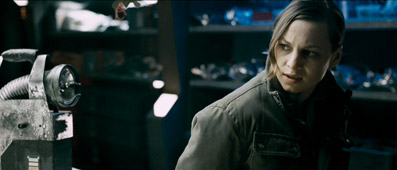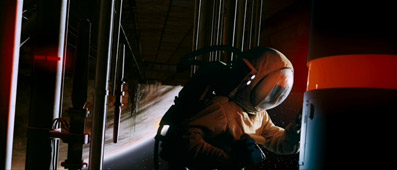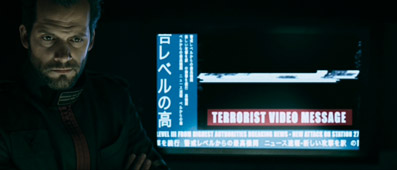|
It's both a blessing and a millstone that any new science fiction film set primarily on a spacecraft is shaped in part by two of modern genre cinema's most iconic and influential works, Stanley Kubrick's 2001: A Space Odyssey and Ridley Scott's Alien. A blessing in the immaculate blueprint those two films provided for the creation of a thoroughly convincing future reality, a millstone because any film that openly works from these blueprints is instantly and often unfairly labelled an imitator.
But it's a bold genre filmmaker who isn't at least partially influenced by one or both of these giants. Alien in particular dispensed with the idea that spaceship interiors had to look fancifully futuristic, or at least the production designer's concept of what that might be, which often dated the film with designs and technology that in retrospect where simply never destined to be. The Nostromo in Alien looked less like a Buck Rogers flying machine than a floating oil refinery, a 'form follows function' industrial construct whose interior resembled the gangways and corridors of present day factories, the astronauts dressed in everyday work clothes or casual wear – there was no silver, no strange hairdos, no semi-abstract apparel of any kind. This was the sort industrial space travel you could believe was real and even envisage undertaking yourself. No special training was required here, just turn up in your overalls and work boots and be ready for duty. This has given the film a longevity that few others have been able to effectively maintain over time – take a look at Alien now, thirty-one years after it first appeared, and the fashions, decor and interior workings of the Nostromo still seem utterly plausible. It's no wonder that almost every off-world spaceship since, from the mining colony in Outland to the title ship in Event Horizon, owes a sizeable debt to the visual style of Scott's groundbreaking science fiction monster movie.

It's certainly a key influence on the slow-burning Swiss science fiction thriller Cargo, which really deserves to find a wider UK audience than its direct-to-DVD status and German dialogue will probably land it. The story begins in the year 2267, when environmental deterioration has rendered the Earth uninhabitable and the entire population now lives in overcrowded orbiting space stations, where disease is rife and the citizens dream of living on Rhea, a distant planetary paradise accessible only to those with the money to fund the lengthy journey. Desperate to move there and be reunited with her sister Arianne, Dr. Laura Portmann joins the crew of the cargo ship Kassandra for an eight year voyage that she hopes will pay for her ticket. The majority of the trip is spent in cryogenic hibernation, with each crew member in turn woken for a solitary eight-month tour of duty to monitor ship operations. Near the end of her shift, the last one of the journey, Laura is troubled by sounds from the cargo hold and becomes convinced there is someone or something on board besides herself and her sleeping companions.
For all my complaints about the detrimental effect it has had on the action movie, CGI must feel like a gift from the gods to anyone making a low budget science fiction film, affording them access to imagery they could never have afforded using matte paintings or model work. The opening scene here is a case in point, the gigantic rotating wheel of the space cities on which humanity now lives providing a visually breathtaking attention grabber that also grounds Laura's motivation for the trip in a degree of tangible reality.
Exposition is supplied in the early stages though the video messages Laura sends to Arianne, but following the disturbance in the cargo hold, the entire crew is awakened from cryogenic sleep to investigate. Did I mention that Alien was an influence? Needless to say, they explore the cargo hold and what they discover shapes the subsequent narrative, and frankly that's where any self-respecting plot synopsis should self-terminate. This is, after all, a science fiction thriller whose narrative progression relies in part on us only knowing as much as the crew about what's happening, and the manner in which the mystery unfolds is one of the things that lifts Cargo above the current science fiction average.
The strength of its ideas and the economy of its storytelling are backed by some subtle game-playing with genre traditions and audience expectations. The characters are a case in point. There's cheerless captain Pierre Lacroix, his officious first officer Anna Lindbergh, grumpy blue collar engineer Claudio Vespucci, his taciturn colleague Igor Prokoff, insular system administrator Miyuki Yoshida, and government-assigned sky marshal Samuel Decker, who we're encouraged to distrust from the start because he works for the authorities and has a beard. All play initially to stock expectations, but as the story progresses we're given cause to doubt our initial impressions, and it becomes increasingly hard to work out who to trust or just who might be in league with whom and why.

A key strength of Cargo is that, save for a couple of character side-steps, it stays on the right side of plausibility, from the worn-down industrial look of the ship and the use of an electrically cooled viscous liquid for hypersleep, to the revelations about Rhea and the motivations of those who seek to expose the truth. Here the film does a subtly effective job of highlighting how activists with a just cause can be demonised as terrorists by those with the power and their own agenda, and it's always a pleasure to find a film whose story lives up to its visual panache. We're not talking new ideas here, but they're intelligently devised and satisfyingly played out in a story that works in tandem with the action and atmosphere rather than playing second fiddle to both.
The borrowings are there and sometimes quite visible (or in the case of a 2001 reference, audible), and I'd be willing to bet that first time feature directors Ivan Engler and Ralph Etter have also spent some time on the video game Dead Space, but these influences are put to effective use in a work that's involving and original enough to stand on its own merits. It may be pushing it to suggest, on the basis of this and last year's ingenious Moon, that the low-budget science fiction film is undergoing a renaissance, but with its mainstream cousin increasing playing like an offshoot of the action movie, this seems to be where the genre's heart and soul currently lie.
We tend to expect our science fiction movies to look good and the DVD and Blu-ray transfers to be as close as dammit to pristine. You can thank 2001 for that one. Cargo may be low budget by present genre standards (it was made for a little over $4,000,000, compared to the $237,000,000 paid out to throw Avatar at the screen) but still looks the business, thanks to Ralph Baetschmann's moody scope cinematography, Matthias Noger's industrial production design, and some expansive interior wide shots created of the CG team. The transfer captures this in impressively crisp detail and boasts a well balanced contrast range and a consistent reproduction of the film's earthy colour scheme. The framing is 2.35:1 and the picture is anamorphically enhanced.

And here's where it all goes just a little bit wrong. The soundtrack was mixed in Dolby EX surround and has attracted praise for its unsettling use of directional effects and inclusive atmospherics, strengthening the bond with the sometimes aurally terrifying Dead Space and just the sort of thing I always enjoy being wound up by. So what do we get here? A Dolby stereo 2.0 track. Now I should emphasise that there's nothing whatsoever wrong with sound quality – it's clear, has an excellent range and reasonable separation – but stripping the soundtrack of its behind-your-head scares and a sense that you're in the midst of the action rather than sitting in front of it seems a downright barmy decision. I can't speak for the Blu-ray release, and given that a 5.1 track was promised on the press release I do wonder if this is a review disc thing, but I'd scrutinise the small print on the back of the box before deciding to buy.
Additional: consumer reviews from on-line stores confirm that both the DVD and Blu-ray are saddled with the Dolby 2.0 stereo track only. If you're looking for a disc with the correct soundtrack (and it really is worth it) and far better extra features then check out the German Ascot Elite Blu-ray disc, reviewed here.
Only a Trailer (1:59), which pushes the film a little too hard as an action-packed scare fest.
An intelligent, involving and atmospheric science fiction story that, like its stable mate Moon, is a solid advertisement for the ingenuity and vision of low budget genre filmmakers and a good example of how to make CGI compliment instead of dominating or dictating the content of a film. The picture looks great but the absence of the original surround soundtrack is a huge disappointment and really lets the disc down, particularly given the paucity of extras. |